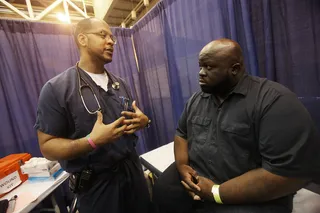The 411 on Gonorrhea
Statistics show Blacks are disproportionately infected.

1 / 11
How You Can Decrease Your Risk - Months after scientists revealed that a drug-resistant form of gonorrhea had emerged in Europe, health officials in the U.S. announced last week that the infection has grown resistant to all but one antibiotic, and fears continue to grow that it is only a matter of time before an incurable strain emerges. With an estimated 700,000 Americans being diagnosed with gonorrhea each year — and African-Americans making up 69 percent of all reported cases in 2010 — the time to protect your health is now. —Britt Middleton (Photo: REUTERS/Morris Mac Matzen)

2 / 11
"Superbug" Status - In its Aug. 10 report, the U.S. Centers for Disease Control and Prevention (CDC) said that the oral antibiotic cefixime is becoming less effective in treating gonorrhea, which leaves only the injectable generic antibiotic ceftriaxone, used in combination with one of two oral antibiotics, as the last treatment option. "Superbug" strains of gonorrhea that resist all forms of treatment made up 1 and 10 cases of sexually transmitted diseases reported in Europe in 2010, though there have yet to be any cases of untreatable gonorrhea reported in the U.S. (Photo: Joe Raedle/Getty Images)

3 / 11
How Is Gonorrhea Spread? - Gonorrhea is a sexually transmitted infection (STI) caused by the bacteria neisseria gonorrhoeae. It is spread primarily through contact with the penis, vagina, mouth or anus. Gonorrhea can also be spread from a mother to her baby during delivery. (Photo: GettyImages)

4 / 11
Common Symptoms - Many people infected with gonorrhea show no signs of symptoms, which is why regular STI testing is encouraged by health professionals. Among men and women, symptoms include sore throat, painful urination and discharge from the penis or vagina. (Photo: Mario Tama/Getty Images)
Photo By Mario Tama/Getty Images

5 / 11
Racial Disparities - In 2010, the rate of gonorrhea among Blacks was 18.7 times the rate among whites, according to the CDC. (Photo: GettyImages)
ADVERTISEMENT

6 / 11
Gonorrhea and Black Women - In 2010, the infection rate for Black women aged 15–19 was 17.1 times the rate among white women in the same age group. Black women aged 20–24 had an infection rate that was 12.7 times the rate among white women in the same age group. (Photo: Joe Raedle/Getty Images)

7 / 11
Gonorrhea and Black Men - Additionally, the CDC reported that in 2010, Black men aged 15–19 had a gonorrhea rate 37.4 times than that of white men in the same age range and Black men aged 20–24 years had a rate that was 22.6 times the rate of their white counterparts. (Photo: Stephen Chernin/Getty Images)

8 / 11
Risk Factors - Having multiple sexual partners, not using condoms during sex, abusing alcohol and drugs and having sex with a person who has had an STI in the past are behaviors known to increase the risk for contracting gonorrhea, the CDC reports. (Photo: Spencer Platt/Getty Images)

9 / 11
Complications From Infection - If left untreated, gonorrhea can cause pelvic inflammatory disease that can lead to infertility and increase the risk of life-threatening ectopic pregnancy in women. In men, the disease can cause epididymitis, a painful condition of the testicles that may lead to infertility. Untreated gonorrhea can also increase a person’s risk of contracting or transmitting HIV. (Photo: GettyImages)

10 / 11
Protect Yourself - While abstaining from sexual activity is the only absolute method for preventing gonorrhea, limiting your number of sexual partners and knowing their status can help prevent the spread of the disease. Additionally, you can greatly reduce the risk for contracting gonorrhea or other STIs by using condoms every time you have sex. (Photo: GettyImages)
